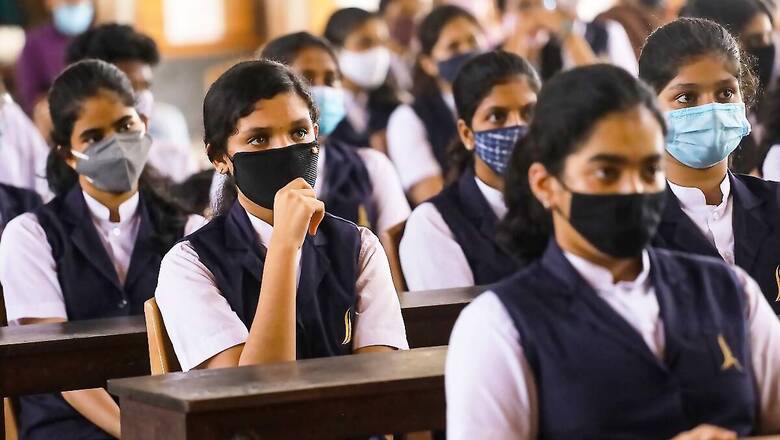
views
The new academic session for the board exams of 2022 has started already even as the 2021 edition is far from over. Worryingly for some academicians, the new classes of 10th and 12th are the ones who were promoted without exams, which makes it hard for them to assess the learning levels of the students. Those who had conducted the exams before the Covid-19 restrictions claim to have observed a huge learning gap. This means the level of learning or understanding of concepts in students is not as much as it should have been.
Even though most students, parents, and teachers unanimously blame the online classes and school shutdown for the learning gaps, there is no end in sight for online education as Covid-19 cases continue to rise. For the lakhs of students who would be appearing for the board exams in 2022, there are no syllabus cuts announced yet. Teachers believe that they would have to start preparing these students by clearing concepts of previous year’s topics and writing practice. For the batch of 2021, CBSE and several other boards had announced to cut the syllabus by about 30 per cent.
When Pallavi Upadhyaya, principal of DPS at RNE Ghaziabad decided to hold offline exams for classes 9 to 11, she had to counsel the parents first. She claims to have held three rounds of counselling with parents of students in classes 9 and 11 on why the exams were needed to be held physically and in offline mode. This was before the second wave of the pandemic had hit India. “In school from home, even though children were online, their attentiveness during lectures and classes had been reduced. Parents were also not aware of how much time of what their child is spending online is actually focused on studies,” she said.
On holding offline exams for classes 9 and 11, she says she found glaring learning gaps. “The idea behind conducting these exams was not to make students feel bad but the aim was to make teachers aware of where each child stands,” she said. To fill these gaps the school had planned to hold remedial classes to teach relevant topics from classes 9 and 11 to the students who have now been promoted to classes 10 and 12, respectively.
Performance fluctuates between offline-online modes
The case was not the same for students who appeared for the exams in online mode. Sonia Anil Verma, principal of Khaitan School, Ghaziabad, says that the performance of students in online and offline exams varied vastly. She says that when students appeared for the exams in offline mode, their performances had fallen as they did not appear in an exam-like pressure environment at the time of online exams. Some parents also tend to help their children unknowingly and even knowingly ‘gave them hints’ during online exams. On holding offline exams for the same students, their scores had fallen. “We found that most of the students had troubles with subjects having practical aspects including physics, chemistry, biology, economics among others,” she said.
Exam-taking skill, social skills amiss
However, it is not just the loss of academics that the principal had noted. Verma also maintains that there is a wide gap between the social and behavioural aspects that students have missed upon which could be filled only by bringing them back with their peers in a staggered manner. However, currently, the schools are shut again.
Faced with a similar situation, the principal of Seth Anandram Jaipuria School in Kanpur, Shikha Banerjee, found the solution in repeated exams and focused preparation. “Students at my school had started to ask for physical classes way before it was allowed. It was the students who realised that they are missing some concepts which are better explained in the face-to-face mode. When we were allowed to open schools for some time, we had focused on students in classes 9 to 12. After taking exams and assessing exactly the areas where students are facing learning gaps, we started holding focused classes and then again asked students to take tests. It was after repeated test-taking and focused teaching that we were able to fill in some gaps,” she said.
Banerjee said it was not just the face-to-face learning but extra writing practice and time-bound test-taking skills that were missing in students across classes.
Need to improve on lesson planning for online classes
To fill these learning gaps, offline classes are not the only way, believes Bishwajit Banerjee, principal, VidyaGyan at Bulandshahr. Interestingly, VidyaGyan is a residential school that focuses more on underprivileged children most of whom do not have access to devices and hail from areas with low connectivity. The principal says that the need is to make the lessons more interactive and neatly planned to retain students’ attention.
“After initial hiccups, students now have started to get a grasp of online learning. We need to now look at ways to make online classes more interesting and more vibrant so students stay focused and we as teachers retain their attention,” said Banerjee. He said that students being more well-versed with technology lose interest when teachers try to replicate old ways of teaching in the new mode of delivery.
While the school too registered a learning gap, the principal said that reinforcement of lectures and important topics, holistic assessment including daily feedback, and revisions are the teachers’ best friends in training the batch for the board exams of 2022.
Read all the Latest News, Breaking News and Coronavirus News here. Follow us on Facebook, Twitter and Telegram.



















Comments
0 comment